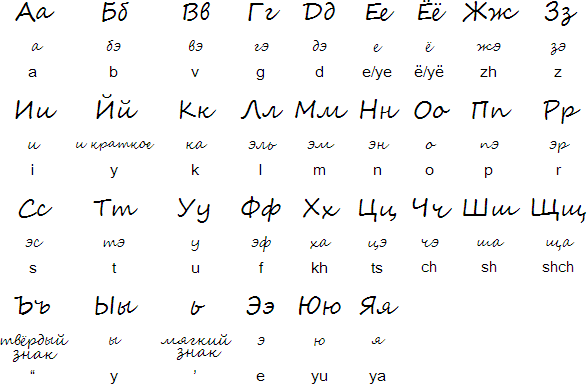
Метр o (Metro, underground railway) - Pronounced "mye-tro".Ĭlick the green play icon to listen to the word pronounced in Russian. It may take some time to get used to pronouncing it with consonants. Ы and И are corresponding vowels but don't really follow this pattern. It may help to note the corresponding vowels. You may have noticed that there are often two forms of a vowel, hard and soft. (Try inflecting a very slight "y" sound onto letter before it.) A note about vowels

Think of the "p" sound in the word "pew". Ь ь - The 'Soft Sign' makes the previous letter 'soft'. It indicates a slight pause between sylables. Pronunciation Symbols(These letters have no sound on their own, but are still considered letters.). So "oй" is like the "oy" sound in "boy" or "aй" is like the "igh" in "sigh". Й й - This letter is used to form diphthongs. (Said with your tongue slightly back in your mouth.) Ы ы - Pronounced like the "i" in "bit" or "ill". Try putting your tongue in the same position as you would to say "ch" but say "sh" instead.Įnglish speakers may find it hard to define the difference between "ш" and "щ". Щ щ - Pronounced like "sh" but with your tongue on the roof of your mouth. Ч ч - Pronounced like the "ch" in "chips" or "church". Ц ц - Similar to the "ts" sound in "sits" or "its". (As there is no english symbol for this sound, it is usually represented as "zh") Ж ж - Like "s" in "measure", "pleasure" or "fusion" or like "g" in colour "beige". (Note: In modern Russian you may find this letter simply written as Е е.) Я я - Pronounced like the "ya" in "yard". (Pronounced much like the english word "you"). Ю ю - Pronounced like the "u" in "universe". (The sounds will be familiar, but they don't have their own letter in English). (Note: The hand-written form for " и" looks a little like the english "u"). (Sometimes equivalent to the english letter "i", the short 'ee' sound.). Russian letters that look unusual, but have familiar sounds However, this is often pronounced more like the "ch" in the Scottish "Loch" or German "Bach", or the mexican pronunciation of "x" in "Mexico". Х х - Pronounced like the "h" in "hello". У у - Pronounced like the "oo" in "boot" or "root". (It might help to remember that it's used like the "s" sound in the english words "centre" and "cent".) Р р - Pronounced like the "r" in "run", but it is rolled. (These are the most important to learn so you don't get them mixed up.) It should always start from the top, as it looks quite similar to the letter " м") Russian letters that look like english letters but sound different. (Note: The hand-written (and italic) form is " т". When un-stressed it is pronounced more like the letter "a". O o - When stressed, it is pronounced like the "o" in "bore".

(Note: Unlike english, the hand-written " м" should always start from the bottom) This letter replaces the english "c" sound in words like "cat". К к - Pronounced like the "k" in "kitten" or "kangaroo". It is not the 'flat' "a" sound you sometimes hear in words like "cat" or "flat". А а - Pronounced like the "a" in the word "father" or "car". Russian letters that are (almost) the same.

For your reference we will make some notes about unusual hand-written forms, however this will be covered in another lesson so don't worry too much yet. Now let's have a look at these letters in detail. Here is what the Russian alphabet looks like (in dictionary order). 11 vowels, 20 consonants, and 2 pronunciation signs. There are 33 letters in the Russian alphabet. The Russian alphabet is also known as the Cyrillic alphabet. (Example “sh”).Įither before or after this lesson we recommend you print the alphabet table, and stick it up next to the computer (or around the house), to help you with the following lessons. Russian also has one letter to one sound, unlike English where two letters often make one sound. Unlike English where the pronunciation of a word may not be clear from its written form. In fact, the great thing about Russian is that almost all words can be sounded out as they are written. It may seem daunting to learn a new alphabet, but it is relatively easy. Even if you don't plan to learn the language, knowing the alphabet is great for travelling because you can read all the street and shop signs. The Russian alphabet is easy to learn! Learning the alphabet is the first step to learning the Russian language.


 0 kommentar(er)
0 kommentar(er)
